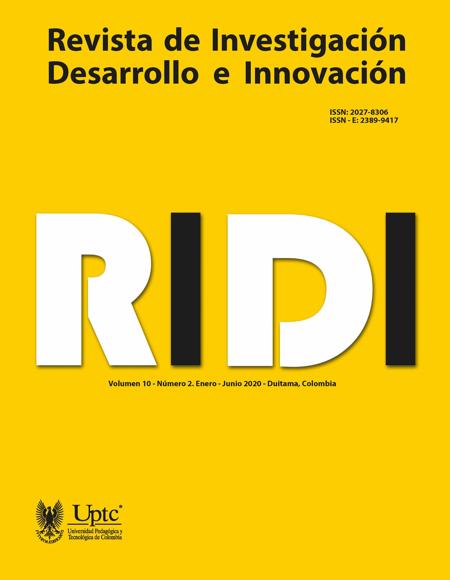Characterization of interdisciplinary activities in a Colombian faculty of arts

Abstract
Knowledge fragmentation separates educational organizations from reality and calls into question the legitimacy of the academic endeavors before society. This research seeks to contribute to the resolution of knowledge management problems associated with interdisciplinary work in a faculty of arts. The exploratory and descriptive study analyzes the implicit and explicit knowledge of faculty professors through the use of interviews and structured surveys. The sample was formed by 22 teachers of a Colombian university. The results show a potential interaction between team members of the faculty, suitable for exploration in project development, for which it is necessary to focus on a vision and create spaces for collective project construction from a systemic perspective
Keywords
knowledge management;, interdisciplinary projects;, faculty of arts;, higher education
Author Biography
Alejandro Antonio Naranjo-Gaviria
Arquitecto, Magíster en Arquitectura y Urbanismo
Elisabeth Herreño-Téllez
Diseñadora Industrial, Magíster en Ingeniería
References
Augsburg, T. (2005). Becoming interdisciplinary: an introduction to interdisciplinary studies. New York, USA.
Bark, R. H., Kragt, M. E., & Robson, B. J. (2016). Evaluating an interdisciplinary research project: Lessons learned for organisations, researchers and funders. International Journal of Project Management, 34 (8), 1449–1459. doi: https://doi.org/10.1016/j.ijproman.2016.08.004
Carr, G., Loucks, D. P., & Blöschl, G. (2018). Gaining insight into interdisciplinary research and education programmes: A framework for evaluation. Research Policy, 47 (1), 35–48. doi: https://doi.org/10.1016/j.respol.2017.09.010
Colciencias. (2018a). Reconocimiento De Investigadores Del Sistema Nacional De Ciencia, Tecnología E Innovación, 233. doi: https://doi.org/10.1017/CBO9781107415324.004
Colciencias. (2018b). Política Nacional de Ciencia e Innovación para el Desarrollo Sostenible. Bogotá, Colombia: Panamericana Formas e Impresos S.A.
Departamento Nacional de Planeación, DNP. (2018). La Agenda 2030 en Colombia. Recuperado de: https://www.ods.gov.co/
Doucet, I., & Janssens, N. (2011). Transdisciplinary knowledge production in architecture and urbanism: towards hybrid modes of inquiry. New York, USA: Dordricht.
Francisco I. (2015). Carta Encíclica Laudato Si´ del Santo Padre Francisco sobre el cuidado de la casa común. Roma, Italia: Librería Editrice Vaticana.
Galeano-Barrera, C. J., Bellón-Monsalve, D., Zabala-Vargas, S. A., Romero-Riaño, E., & Duro-Novoa, V. (2018). Identificación de los pilares que direccionan a una institución universitaria hacia un Smart-Campus. Revista de Investigación, Desarrollo e Innovación, 9 (1), 127-145. doi: https://doi.org/10.19053/20278306.v9.n1.2018.8511
ITESO. (2016). Proyectos de Aplicación Profesional, PAP, ITESO Aniversario 10. Universidad Jesuita de Guadalajara. Recuperado de: https://www.youtube.com/watch?v=6og0TB9NUR4
Kuhn, T. S. (2004). La Estructura de las Revoluciones Científicas. Buenos Aires, Argentina: Fondo de Cultura Económica.
Maturana, H., & Varela, F. (2003). El Arbol del Conocimiento. Las bases biológicas del entendimiento humano. Buenos Aires, Argentina: Editorial Lumen.
Morin, E. (2007). Introducción al Pensamiento Complejo. Barcelona, España: Editorial Gedisa.
Nonaka, I., & Takeuchi, H. (1995). The knowledge creating company: how Japanese companies create the dynamics of innovation. New York, USA: Oxford University Press.
Organización de las Naciones Unidas, ONU. (s.f.). Objetivos y metas de desarrollo sostenible. Recuperado de: https://www.un.org/sustainabledevelopment/es/objetivos-de-desarrollo-sostenible/
Organisation for Economic Cooperation and Development, OECD. (1972). Interdisciplinary: Problems of Teaching and Research in Universities. París, Francia: Centre for Educational Research and Innovation.
Rijnsoever, F. J., & Hessels, L. K. (2011). Factors associated with disciplinary and interdisciplinary research collaboration. Research Policy, 40 (3), 463–472. doi: https://doi.org/10.1016/j.respol.2010.11.001
Thackara, J. (2012). Diseñando para un mundo complejo. México: Designio.
Thompson, J. (2014). Discourses of transdisciplinarity : Looking Back to the Future. Futures, 63, 68–74. doi: https://doi.org/10.1016/j.futures.2015.01.003